|
|
|
Sort Order |
|
|
|
Items / Page
|
|
|
|
|
|
|
| Srl | Item |
| 1 |
ID:
170031
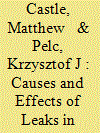

|
|
|
|
|
| Summary/Abstract |
International negotiations are founded on secrecy. Yet, unauthorized leaks of negotiating documents have grown common. What are the incentives behind leaks, and what are their effects on bargaining between states? Specifically, are leaks offensive or defensive: are they intended to spur parties to make more ambitious commitments, or are they more often intended to claw back commitments made? We examine these questions in the context of trade negotiations, the recurring form of which affords us rare empirical traction on an otherwise elusive issue. We assemble the first dataset of its kind, covering 120 discrete leaks from 2006 to 2015. We find that leaks are indeed rising in number. Leaks are clustered around novel legal provisions and appear to be disproportionately defensive: they serve those actors intent on limiting commitments made. The European Union (EU) appears responsible for the majority of leaks occurring worldwide. Using party manifesto data to track changing ideological positions within the EU, we find that the occurrence of leaks correlates with opposition to economic liberalization within the average EU political party. Moreover, leaks appear effective in shifting public debate. We examine trade officials’ internal communications and media coverage in the wake of a specific leak of negotiations between Canada and the EU. A given negotiating text attracts more negative coverage when it is leaked than when the same text is officially released. In sum, political actors leak information strategically to mobilize domestic audiences toward their preferred negotiating outcome.
|
|
|
|
|
|
|
|
|
|
|
|
|
|
|
|
| 2 |
ID:
093820
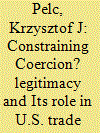

|
|
|
|
|
| Publication |
2010.
|
| Summary/Abstract |
The role of legitimacy in international relations is a topic of much debate, yet there is little understanding of the mechanism behind it. Here I address this discrepancy by asking: are state threats perceived as (il)legitimate more or less likely to be successful? By operationalizing illegitimacy as unilateral action in the presence of a multilateral option, I consider the variation in the success of U.S. trade measures from 1975 to 2000. As I show, the (il)legitimacy of threats modifies the nature of the signal sent by concessions to those threats, and this effect can be measured and predicted. I find that, controlling for material pressure, perceived illegitimacy of U.S. trade threats decreases the likelihood of a target conceding by over 34 percent. Moreover, it pays to resist: targets that resist illegitimate unilateral measures from the United States are 25 percent less likely to encounter similar unilateral measures over the following five years.
|
|
|
|
|
|
|
|
|
|
|
|
|
|
|
|
| 3 |
ID:
151155
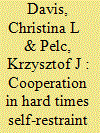

|
|
|
|
|
| Summary/Abstract |
Hard times give rise to greater demand for protection. International trade rules include provisions that allow for raising barriers to aid industries when they suffer economic injury. Yet widespread use of flexibility measures may undermine the trade system and worsen economic conditions. How do states balance these conflicting pressures? This article assesses the effect of crises on cooperation in trade. We hypothesize that governments impose less protectionism during economic crisis when economic troubles are widespread across countries than when they face crisis in isolation. The lesson of Smoot–Hawley and coordination through international economic institutions represent mechanisms of informal governance that encourage cooperation to avoid a spiral of protectionism. Analysis of industry-level data on protection measures for the period from 1996 to 2011 provides support for our claim that under conditions of shared hard times, states exercise strategic self-restraint to avoid beggar-thy-neighbor policies.
|
|
|
|
|
|
|
|
|
|
|
|
|
|
|
|
| 4 |
ID:
119643
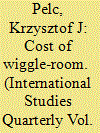

|
|
|
|
|
| Publication |
2013.
|
| Summary/Abstract |
There is considerable variation in the depth of countries' commitments at the World Trade Organization (WTO). While WTO members apply tariffs on imports at roughly comparable levels, the maximum levels allowed on these tariffs vary dramatically, leaving some members with far more flexibility to raise trade barriers overnight. Some countries have argued that such "binding overhang" is harmless unless it is exploited, while other countries disagree. This paper is the first attempt to empirically assess the effect of binding overhang on trade flows. I argue that the mere existence of binding overhang has a strongly negative effect on trade, through the way in which it muddles expectations. Using data at the 4-digit harmonized system product level, covering the WTO membership from 1995 to 2008, I demonstrate that the cost in terms of lost trade resulting from the ability to legally raise a tariff by one point is tantamount to nearly half the cost of having done so. In sum, WTO membership is, by itself, no panacea. Negotiating greater tariff flexibility can water down a country's legal commitments and significantly reduce the benefits flowing from the institution.
|
|
|
|
|
|
|
|
|
|
|
|
|
|
|
|
| 5 |
ID:
149520
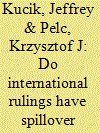

|
|
|
|
|
| Summary/Abstract |
How influential are international courts? Can their rulings reach beyond a given case and affect the behavior of countries not party to the dispute? International law is clear on the matter: rulings have no formal authority beyond the case at hand. This tenet is consistent with the incentives of sovereign states wary of delegating too much authority to courts. By contrast, the authors claim that even in the absence of formal authority, the rulings of international courts can affect behavior by mobilizing pro-compliance groups in countries not party to a dispute. They test these beliefs in the context of the World Trade Organization (WTO) through a novel approach. Because WTO rulings have implications for the fortunes of publicly traded firms, they examine whether financial markets bet on there being spillover effects beyond the case at hand. They rely on two quantitative case studies to test for a cross-border and a cross-industry spillover effect: can rulings have effects in countries and on industries other than those at issue in the initial dispute? The results suggest that the answer is a tentative yes. The spillover effects of international rulings may be a matter of scholarly contention, but their existence is something that financial markets appear willing to bet on.
|
|
|
|
|
|
|
|
|
|
|
|
|
|
|
|
| 6 |
ID:
123020
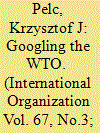

|
|
|
|
|
| Publication |
2013.
|
| Summary/Abstract |
How does international law affect state behavior? Existing models addressing this issue rest on individual preferences and voter behavior, yet these assumptions are rarely questioned. Do citizens truly react to their governments being taken to court over purported violations? I propose a novel approach to test the premise behind models of international treaty-making, using web-search data. Such data are widely used in epidemiology; in this article I claim that they are also well suited to applications in political economy. Web searches provide a unique proxy for a fundamental political activity that we otherwise have little sense of: information seeking. Information seeking by constituents can be usefully examined as an instance of political mobilization. Applying web-search data to international trade disputes, I provide evidence for the belief that US citizens are concerned about their country being branded a violator of international law, even when they have no direct material stake in the case at hand. This article constitutes a first attempt at utilizing web-search data to test the building blocks of political economy theory.
|
|
|
|
|
|
|
|
|
|
|
|
|
|
|
|
| 7 |
ID:
095024
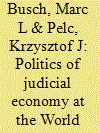

|
|
|
|
|
| Publication |
2010.
|
| Summary/Abstract |
International institutions often moderate the legal decisions they render. World Trade Organization (WTO) panels do this by exercising judicial economy. This practice, which is evident in 41 percent of all rulings, involves the decision not to rule on some of the litigants' arguments. The constraint is that it can be appealed. We argue that panels exercise judicial economy when the wider membership is ambivalent about the future consequences of a broader ruling. This is proxied by the "mixed" (that is, nonpartisan) third-party submissions, which are informative because they are costly, jeopardizing a more decisive legal victory that would benefit these governments too. We empirically test this hypothesis, and find that mixed third-party submissions increase the odds of judicial economy by upwards of 68 percent. This suggests that panels invoke judicial economy to politically appease the wider WTO membership, and not just to gain the litigants' compliance in the case at hand.
|
|
|
|
|
|
|
|
|
|
|
|
|
|
|
|
| 8 |
ID:
133944
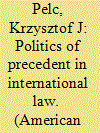

|
|
|
|
|
| Publication |
2014.
|
| Summary/Abstract |
The concept of precedent is fundamental to domestic courts, especially in Anglo-American common law systems, where judges are bound to the court's past decisions. By contrast, precedent has no formal authority in international law. Legal scholars point to Article 59 of the International Court of Justice (ICJ) Statute in this respect, according to which international legal rulings are binding only on the parties in the dispute at hand, and have no bearing on matters outside of the case.
|
|
|
|
|
|
|
|
|
|
|
|
|
|
|
|
| 9 |
ID:
089038
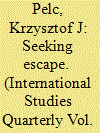

|
|
|
|
|
| Publication |
2009.
|
| Summary/Abstract |
In agreements that include flexibility enhancing mechanisms such as escape clauses, how do institutions realize the benefits of flexibility while preventing its abuse? The conventional wisdom is that escape clauses must be made costly, but I show this claim to be at odds with empirical observation. In the GATT/WTO, the institution where escape clauses are most prevalent, compensation following escape was only widespread in the 1950s. Since then, it has been progressively abandoned, in favor of appeals to exception. This alternative mechanism relies on an institution's ability to verify the severity and exogeneity of the domestic circumstances of states seeking temporary escape. Relying heavily on GATT archives, I show how early on in the institution, members had made the link between costless escape and increased monitoring, and pursued reforms to achieve both objectives. The success of members' ability to verify escapees' domestic circumstances is observed in the record of safeguard disputes throughout the GATT/WTO's history. Finally, I use the hypothesized link between verifiable information and the chosen escape mechanism to explain an otherwise puzzling GATT incident, that of French emergency trade measures in 1968.
|
|
|
|
|
|
|
|
|
|
|
|
|
|
|
|
| 10 |
ID:
154544
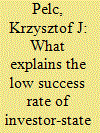

|
|
|
|
|
| Summary/Abstract |
The treatment of foreign investment has become the most controversial issue in global governance. At the center of the controversy lies the mechanism of investor-state dispute settlement (ISDS), which allows private firms legal recourse against governments if government interference has degraded their investment. Using newly released data covering 742 investment disputes, I assess some of the central claims about ISDS. I argue that the regime has indeed undergone an important shift: a majority of claims today deal not with direct takings by low-rule-of-law countries, but with regulation in democratic states. Such “indirect expropriation” claims have seen a precipitous decrease in their odds of legal success over the past twenty years. They are also far less likely to result in early settlement. These parallel trends may be a result of a rise in strategic litigation by investors whose aim is not only to obtain compensation but also to deter governments' regulatory ambitions.
|
|
|
|
|
|
|
|
|
|
|
|
|
|
|
|
| 11 |
ID:
133277
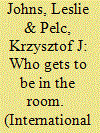

|
|
|
|
|
| Publication |
2014.
|
| Summary/Abstract |
Third parties complicate World Trade Organization (WTO) dispute settlement by adding voices and issues to a dispute. However, complainants can limit third parties by filing cases under Article XXIII of the General Agreement on Tariffs and Trade (GATT), rather than Article XXII. We argue that third parties create "insurance" by lowering the benefit of winning and the cost of losing a dispute. We construct a formal model in which third parties make settlement less likely. The weaker the complainant's case, the more likely the complainant is to promote third party participation and to settle. Article XXII cases are therefore more likely to settle, controlling for the realized number of third parties, and a complainant who files under Article XXIII is more likely to win a ruling and less likely to see that ruling appealed by the defendant. We provide empirical support using WTO disputes from 1995 to 2011.
|
|
|
|
|
|
|
|
|
|
|
|
|
|
|
|
| 12 |
ID:
107531
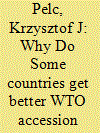

|
|
|
|
|
| Publication |
2011.
|
| Summary/Abstract |
The process by which countries accede to the World Trade Organization (WTO) has become the subject of considerable debate. This article takes a closer look at what determines the concessions the institution requires of an entrant. In other words, who gets a good deal, and who does not? I argue that given the institutional design of accession proceedings and the resulting suspension of reciprocity, accession terms are driven by the domestic export interests of existing members. As a result, relatively greater liberalization will be imposed on those entrants that have more valuable market access to offer upon accession, something that appears to be in opposition to expectations during multilateral trade rounds, where market access functions as a bargaining chit. The empirical evidence supports these assertions. Looking at eighteen recent entrants at the six-digit product level, I find that controlling for a host of country-specific variables, as well as the applied protection rates on a given product prior to accession, the more a country has to offer, the more it is required to give. Moreover, I show how more democratic countries, in spite of their greater overall depth of integration, exhibit greater resistance to adjustment in key industries than do nondemocracies. Finally, I demonstrate that wealth exhibits a curvilinear effect. On the one hand, institutionalized norms lead members to exercise observable restraint vis-à-vis the poorest countries. On the other hand, the richest countries have the greatest bargaining expertise, and thus obtain better terms. The outcome, as I show using a semi-parametric analysis, is that middle-income countries end up with the most stringent terms, and have to make the greatest relative adjustments to their trade regimes.
|
|
|
|
|
|
|
|
|
|
|
|
|
|
|
|
| 13 |
ID:
168540
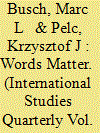

|
|
|
|
|
| Summary/Abstract |
The rulings of internationals courts are often reduced to “who won?,” but much more is at stake. Like other institutions, the World Trade Organization (WTO) offers rulings that balance legal discipline against political constraints. We argue that one way in which the WTO handles politically sensitive issues is by increasing the amount of affect in their rulings. In doing so, judges provide national governments with discursive resources to persuade their domestic audiences of the legitimacy of compliance. To test our expectations, we conduct a text analysis of all rulings rendered by the institution since 1995. Specifically, we find that more politically charged decisions, such as the ones concerning nonfiscal rather than fiscal aspects of national treatment claims, are explained in qualitatively different terms. We also find that, as an issue gets ruled on repeatedly, the amount of affect deployed progressively decreases. In sum, the WTO chooses its words strategically to persuade litigants, and their domestic audiences, of the legitimacy of compliance in politically fraught disputes.
|
|
|
|
|
|
|
|
|
|
|
|
|
|
|
|
|
|
|
|
|